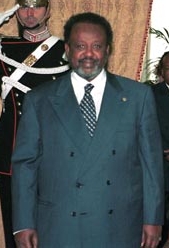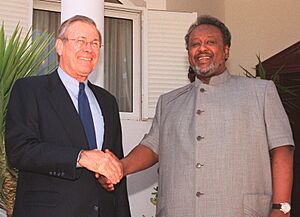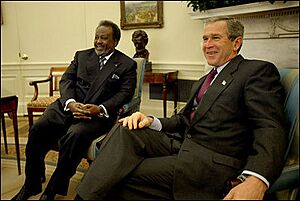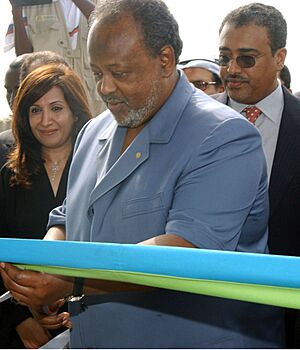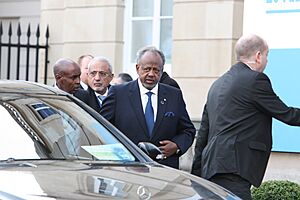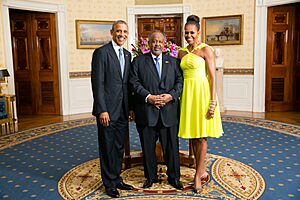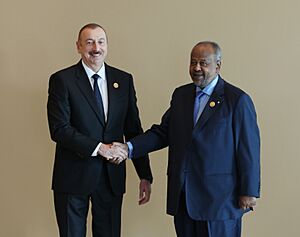Ismaïl Omar Guelleh facts for kids
Quick facts for kids
Ismaïl Omar Guelleh
|
|
|---|---|
|
إسماعيل عمر جيله
|
|
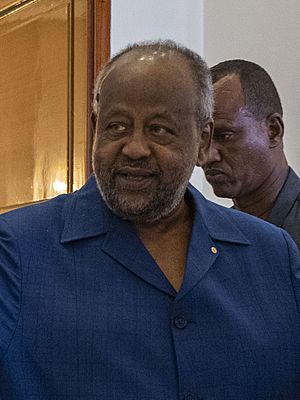
Guelleh in 2023
|
|
| 2nd President of Djibouti | |
| Assumed office 8 May 1999 |
|
| Prime Minister | Barkat Gourad Hamadou Dileita Mohamed Dileita Abdoulkader Kamil Mohamed |
| Preceded by | Hassan Gouled Aptidon |
| Personal details | |
| Born | 27 November 1947 Dire Dawa, Ethiopian Empire |
| Political party | People's Rally for Progress |
| Spouse | Kadra Mahamoud Haid |
| Relations | Ridwan Ismaïl Saala |
| Children | Haïbado Ismaïl Omar Fatouma-Awo Ismaïl Omar Nasir Omar Ismaïl Saalah (1st line) Ahmad Shaheer Mappingé (2nd line) |
Ismaïl Omar Guelleh (Somali: Ismaaciil Cumar Geelle; Arabic: إسماعيل عمر جيله; born 27 November 1947) is a politician from Djibouti. He has been the President of Djibouti since 1999. This makes him one of the leaders who has served the longest in Africa. People often call him by his initials, IOG.
Guelleh first became President in 1999. He was chosen by his uncle, Hassan Gouled Aptidon, who had led Djibouti since it became independent in 1977. Guelleh was re-elected in 2005, 2011, 2016, and 2021. Many opposition groups did not take part in these elections. They complained about problems with how the elections were run. His leadership has been criticized by some groups who say there isn't enough freedom. Internationally, he is a close friend of France.
He received the Padma Vibhushan award from India on 25 January 2019. This is India's second-highest award for civilians. He got it for helping to safely bring Indian citizens out of Yemen during the country's civil war.
Contents
Early Life and Start in Politics
Guelleh was born in Dire Dawa, Ethiopia. He comes from the Mamassan family group, which is part of the Ciise Dir clan of the Somali people. His father, Omar Guelleh, was one of the first local teachers in the 1930s. Later, he worked for the Franco-Ethiopian Railway Company, which built the train line from Djibouti to Addis Ababa.
When Guelleh was young, he went to a traditional Islamic school. In 1960, he moved to Djibouti before finishing high school. In 1964, at 18, Ismaïl Omar Guelleh started working for the French government in the area. He could speak many languages, including Amharic, Somali, Arabic, French, Italian, and English.
In 1975, he was suspended from his job. This was because he was thought to be sharing information with the independence movement. He then joined the African People's League for Independence (LPAI). This group was led by Hassan Gouled Aptidon and worked for Djibouti's independence. Guelleh was chosen for the LPAI’s main committee in 1983. He later became the head of a cultural group in Paris. In 1987, he became a leader in the party.
After Djibouti became independent, he became the head of the secret police. He also became the chief of staff for his uncle, Hassan Gouled Aptidon, for over 20 years. He was trained by the Somali National Security Service and the French Secret Service. He was expected to become his uncle's successor.
In February 1991, he tried to take control of Zeyla in Awdal, Somaliland. This happened during the Somaliland War of Independence. However, the forces supported by Djibouti were quickly defeated by the Somali National Movement (SNM).
He became President of Djibouti in 1999.
Presidency
First Term: 1999 to 2005
Djibouti is one of a few countries in Africa where one family member has directly taken over from another as leader.
On 4 February 1999, President Gouled Aptidon, Ismaïl Guelleh's uncle, announced he would retire. His party, the ruling People's Rally for Progress (RPP), then chose Guelleh as their candidate for president. Guelleh was the joint candidate for the RPP and a part of the Front for the Restoration of Unity and Democracy (FRUD). He won the presidential election on 9 April 1999 with 74.02% of the votes. He defeated the only other candidate, Moussa Ahmed Idriss. Guelleh took office on 8 May. Moussa Ahmed Idriss was arrested in September for "threatening the armed forces."
In December 2000, Guelleh removed the head of the National Police Force, Yacin Yabeh. Police officers loyal to Yabeh tried to fight back but failed. Guelleh is also known for helping to create a lasting peace agreement that year. This agreement ended the country’s ethnic conflict that started after independence.
Second Term: 2005 to 2011
The RPP chose Guelleh as their presidential candidate for a second time on 7 October 2004. He was supported by several other parties and was the only candidate in the presidential election on 8 April 2005. Small protests against the elections happened but were quickly stopped by police. Since he had no opponent, Guelleh won 100% of the votes. He was sworn in for a second six-year term on 7 May. He said this would be his last term.
However, in 2010, Guelleh convinced the National Assembly of Djibouti to change the country's rules. This allowed him to run for a third term. This change meant he could be on the ballot for Djibouti's 2011 election. It also led to large protests starting in 2010. These protests were similar to the larger movement for democracy in Arab countries. The protests were quickly stopped, opposition leaders were arrested, and international observers were removed or arrested.
Third Term: 2011 to 2016
Opposition parties decided not to take part in the election. This left only one lesser-known candidate against him. Guelleh won almost 80% of the votes. Human Rights Watch wondered if the election was fair because opposition leaders were jailed twice before the voting. Guelleh again said he would not run for another term.
Guelleh also won the 2016 election with about 87% of the popular vote. As in past elections, the opposition called for a country-wide boycott. They demanded Guelleh hold "transparent, free, fair and just elections." Opposition leaders and human rights groups complained about strict rules and police actions before the polls. A BBC team was arrested and removed shortly before the vote after interviewing an opposition leader.
Fourth Term: 2016 to 2021
He was re-elected for a fifth term in the 2021 election, winning by a large margin. One opposition candidate, Zakaria Ismail Farah, who was new to politics, ran in the election. He accused the government of adding extra votes unfairly and stopping his representatives from watching the voting process. Other main opposition parties did not run candidates. They accused Guelleh of having too much power.
Fifth Term: Since 2021
In June 2021, Guelleh made vaccination against COVID-19 required for both citizens and foreign residents.
During that same month, Guelleh changed who represented Djibouti in other countries. He called back seven ambassadors and appointed new ones to several countries in the Middle East.
Who Might Lead Next?
Guelleh's long time in power has led to questions about who will take over after him. Many expect a trusted person, chosen by him from his close group, to be the next leader. For a long time, his son-in-law and health minister, Djama Elmi Okieh, seemed to be Guelleh's chosen successor. However, after 2018, this changed. The new favored candidate is Naguib Abdallah Kamil, a son of First Lady Kadra Mahamoud Haid from a previous marriage.
By keeping Djibouti's main political figures in their government jobs, Guelleh increased the chance of power struggles within the government. As of May 2021, Prime Minister Abdoulkader Kamil Mohamed and Finance Minister Ilyas Moussa Dawaleh were seen as main contenders for leadership struggles before the 2026 elections. Another possible candidate involved in these power fights is Foreign Minister Mahamoud Ali Youssouf.
How Djibouti is Governed
Leadership Style
During his time as president, Guelleh has worked to place his family members in important political and business jobs. His wife, Kadra Mahamoud Haid, plays a very important role, acting like a vice-president. His two daughters also have key roles: Haibado advises Guelleh, and Fatouma-Awo is deeply involved in the country’s businesses. His son-in-law, Djama Elmi Okieh, is the Minister of Health.
One of the President’s half-brothers, Saad Omar Guelleh, is the General Manager of the very important Port of Djibouti. His first cousin, Djama Ali Guelleh, has been the Director General of the state-owned electricity company, Electricité de Djibouti (EDD), since 1986.
Because his family is so involved in government and business, Guelleh has been able to control the country’s politics, money, and laws very strictly. He also has a strong hold on the police, military, and other security forces. This has ensured that "the Guelleh family's control over all public matters continued."
A message from the US Embassy in Djibouti in 2004, shared on WikiLeaks, described Djibouti as "less a country than a commercial city state controlled by one man, Ismail Omar Guelleh."
In its 2020 report on Human Rights Practices, the US government noted "significant human rights issues" in Djibouti. These included concerns about human rights, including issues with freedom of speech and how people are treated.
Stronger Ties with China
Guelleh has used Djibouti's important location for many years. This has led to large investments in things like ports and logistics. Since 2013, Guelleh has worked to build closer economic and political ties with China. This happened at the same time China became more interested in the Middle East and Africa through its Belt and Road Initiative.
The competition among powerful countries for influence in Djibouti has given Djibouti more options. However, China's influence has also grown. China opened a naval base there in 2017. This has worried Djibouti’s traditional Western friends. They are concerned that China's way of ruling, which gives the leader a lot of power, might encourage Guelleh to act more like that too.
Money invested from China has helped Guelleh's plan to develop the country, similar to the Singapore model. This model is often seen as a government with a lot of power that brings wealth to the country. It does this through strict planning and focusing only on making money, sometimes at the cost of democracy and human rights. Guelleh has often talked about following Singapore’s path in his speeches. He hopes to make Djibouti the "Singapore of Africa." He plans to do this by using the Port of Djibouti's growing role as an important shipping hub.
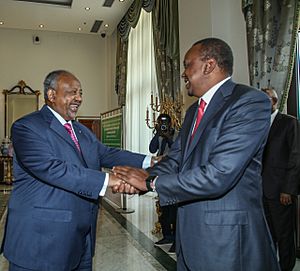
However, experts believe that ongoing government corruption and favoring Chinese investors might stop this development plan from working well. For example, in 2012, the Djibouti government sold its Doraleh Container Terminal part of the Port of Djibouti to a Chinese company. This company was a competitor of DP World, a port operator from the UAE. In February 2018, Ismaïl Guelleh took back DP World’s rights by presidential order. He transferred its assets to a state-run company. With Chinese money, Djibouti also started a long-term project that same year. This project aims to build what is expected to be Africa’s largest free trade zone.
In 2020, the London Court of International Arbitration ruled that Djibouti taking control of the port was against the rules. It ordered that the original rights be given back. The Court had previously told the country to pay $533 million to the DP World company. Djibouti rejected the Court’s ruling. It then gave a quarter of the port's ownership to China Merchants Ports Holdings.
Economy
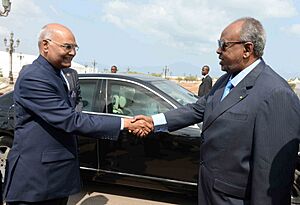
Guelleh's policy of attracting money from other countries for port and logistics buildings has led to steady economic growth. However, it has created an economy that relies on services and needs a lot of money to operate. This means there are not many exports or new job opportunities. Unemployment is still a big problem, especially for young people. A 2015 survey showed that Djibouti’s unemployment rate was 39 percent. Only 25 percent of people old enough to work had jobs. A more recent estimate puts youth unemployment at 80 percent.
Also, the projects that helped the country's economy grow were paid for with money borrowed from other countries. This has led to a lot of debt owed to foreign groups, especially China. Overall, the country’s economy was ranked as "mostly unfree" by the Heritage Foundation’s 2021 Index of Economic Freedom.
The expansion of the Berbera port in Somaliland by DP World could reduce Ethiopia’s need to use Djibouti for much of its trade. This has been thought to be a threat to the port of Djibouti’s main role in the region. Guelleh has said these claims are not true.
Regional Safety
Under Guelleh’s leadership, Djibouti has remained a stable country in a region often affected by conflict. During his presidency, a peace agreement was signed in 2000 between fighting ethnic groups. Also, a border dispute between Djibouti and Eritrea that lasted for ten years was resolved in 2018. The 2018 peace treaty between Ethiopia and Eritrea is expected to reduce Djibouti’s port income in the long run. This could make it harder for Guelleh to keep his strong control over the country.
In 2020, Guelleh hosted the leaders of Somalia and its break-away Republic of Somaliland, as well as Ethiopia’s Prime Minister Abiy Ahmed, for peace talks.
Guelleh strongly supported Ethiopia's Prime Minister Abiy Ahmed in the Tigray War. This war was between the government and rebels. Guelleh said that Ahmed had chosen to "restore law and order at the federal level, and punish those seeking to break up the country." He did not think negotiations were a good idea. He said that the Tigray People's Liberation Front had "structured itself so as to bring the central government to its knees." He also said that talks could "only lead to the partition of Ethiopia," setting a bad example for other groups in the region to try to separate.
Personal Life
Ismaïl Guelleh is married and has four children.
After Guelleh and his group visited Paris in late 2018, France’s National Financial Prosecutor's Office started an investigation. This was about properties in the city that were thought to be bought unfairly. The investigation began after a complaint from an anti-corruption group called Sherpa. It focuses on Guelleh’s wife, eldest daughter, and son-in-law. The investigation is still ongoing as of July 2021.
He owns a property in Dubai.
See also
 In Spanish: Ismail Omar Guelleh para niños
In Spanish: Ismail Omar Guelleh para niños


